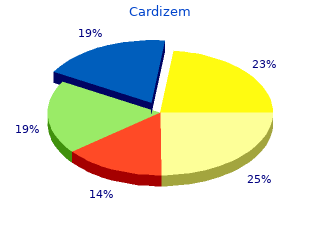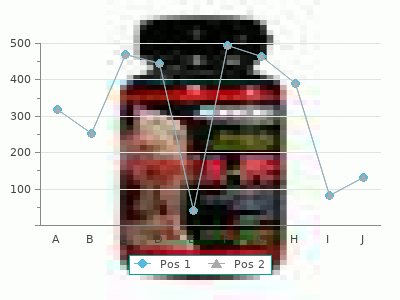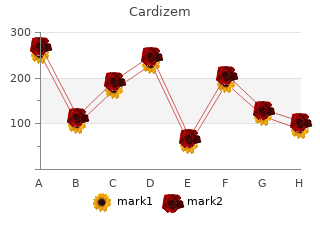Cardizem
By F. Kent. The College of New Jersey.
If necessary 180 mg cardizem with amex, include a description of beverages that may not be considered alcoholic (e purchase cardizem 60 mg online. It is important to read the questions as written and in the order indicated. By following the exact wording, you will obtain results more comparable to those obtained by other interviewers. Most of the questions in AUDIT are phrased in terms of "how often" symptoms occur. It is useful to offer the patient several examples of the response categories (for example, "never," "several times a month," "daily") to suggest how he or she might answer. When he or she has responded, it is useful to probe during the initial questions to be sure that the patient has selected the most accurate response (for example, "You say you drink several times a week. Is this just on weekends or do you drink more or less everyday? If responses are ambiguous or evasive, continue asking for clarification by repeating the question and the response options, asking the patient to choose the best one. At times, answers are difficult to record because the patient may not drink on a regular basis. For example, if the patient was drinking intensively for the month prior to an accident, but not before or since, then it will be difficult to characterize the "typical" drinking sought by the question. In these cases it is best to record the amount of drinking and related symptoms for the heaviest drinking period of the past year, noting that this may be atypical or transitory for that individual. Record answers carefully, including comments to explain any special circumstances, additional information, or clinical inferences. Often patients will provide the interviewer with useful comments about their drinking that can be valuable in the interpretation of the total AUDIT score. Alcoholism is a progressive illness that can destroy the life of the alcoholic and those around him. When someone abuses alcohol to the point of becoming an alcoholic, specific treatment for alcoholism is often necessary. Alcoholics can almost never get better without some form of directed alcohol addiction treatment. Alcohol abuse treatment and alcoholism treatment programs can take several forms. A professional rehabilitation programA self-help alcohol addiction treatmentNo matter which treatment for alcoholism is chosen, support from those around the alcoholic is critical for successful treatment of alcoholism. Alcoholism treatment rehabilitation programs (sometimes simply called rehab) are formal programs that can be done on an inpatient or outpatient basis. Alcohol treatment rehab is typically done in an addiction treatment center or in a hospital and the alcohol addiction treatment is generally done by doctors, nurses and other certified individuals. Often many of the people in rehab treatment for alcoholism are people in recovery themselves. Alcoholism treatment rehabilitation programs are available in these formats:Outpatient or partial hospitalization - Sometimes called day treatmentNo matter what kind of rehabilitation treatment program for alcoholism is chosen, these steps are common:An in-depth assessment is conducted in order to fully understand the alcoholic and the alcohol addiction treatment that would be best for him. This assessment is done by a doctor or a substance abuse counselor and may include information given by the family and friends of the alcoholic. An alcoholism treatment plan is created that outlines problems, treatment goals and the ways to meet those goals. This may also include treatment of health issues besides addiction such as a mental illness. The next step may be medical care during the initial alcochol withdrawal period, known as detoxification or simply detox. Medical care may also be necessary as medication needs to be given during alcohol detox and recovery. Alcohol therapy, including group and individual counseling, will occur during the treatment for alcoholism. Types of counseling vary by alcohol addiction treatment program. Education about alcoholism and alcoholism treatment will occur, sometimes including books to read, written assignments and behaviors to initiate. Life skills are generally also taught during alcohol abuse treatment to help put into place healthy ways of dealing with issues that were previously dealt with by drinking. The alcoholic may be tested for drug and alcohol use during alcohol addiction treatment. Relapse prevention techniques are often taught during rehabilitation to help prevent future drinking. Self-help groups such as Alcoholics Anonymous are introduced.


Goodman cheap cardizem 180mg without prescription, is to remain hopeful that you will get through this buy cardizem 180 mg low cost. Anxiety disorders are highly treatable; people do recover. Goodman: Acceptance is an importance precondition of change. Goodman: What do you believe is really wrong with you? Ang58: I guess I really fear that I have caused myself to have heart trouble or something like that. Ang58: I have just become so in-tune with every little twinge my body makes:)Dr. You might try distracting your mind from your body and all the nuances. Realize that focusing on your anxiety symptoms and being afraid of them is keeping the anxiety cycle alive. David: How important is it for a person to get professional treatment immediately after suffering a relapse? Would it be true, that the longer you wait, the harder it is to recover? I live in a small town with one mental health clinic. Goodman: Have you tried any of the self-help strategies that have been described on anxiety websites? David: There are also anxiety tape programs available. Steffane: When I have a panic attack now, I am starting to take the attitude of "this is another normal thing my body is going through just like stubbing my toe. Am I approaching this right, or am I just making them ultimately something part of my life? Taking the fear component out of having a panic attack is an important first step. Now you need to go to the next step learning to reduce your anxiety symptoms when they happen. Goodman, for being our guest tonight and for sharing your suggestions and insights with us. Also, thank you to the audience for coming and participating. Carolyn Dickman, Education Director of the Midwest Center for Stress and Anxiety. Our conference tonight is on "Attacking Anxiety and Depression". However, Lucinda contacted me and said she had a personal emergency, and we are lucky because Carolyn Dickman, who works with Lucinda, and actually went through her Attacking Anxiety program, is with us tonight. Her story is very interesting and what she was able to accomplish in treating her severe panic attacks and anxiety (Panic Disorder) will hopefully inspire many of you tonight. As a youngster, our guest, Carolyn Dickman, was an anxious child. That was 27 long years of not knowing what was wrong. Intermittently, throughout those years, Carolyn was house bound, travel and vehicle avoidant, prone to bouts of anger and severe depression. Carolyn: I thought I was the only person on earth with the horrible scary thoughts and feelings of dying every day. I always felt out of touch with family and classmates, feeling something was "wrong" with me. David: How did you discover that "something," was Panic Disorder? Carolyn: I had a TV in the kitchen and I was watching it, and I saw Lucinda Bassett talking about body symptoms. I thought, oh dear, she has been sitting on my left shoulder for the past 30 years. I did most things teens and college students do, but with great fear. I was never at peace, I always questioned my decisions.


Serum electrolytes order cardizem 60mg with visa, ketones buy cardizem 120mg line, blood glucose, and if indicated, blood pH, lactate levels, and even blood metformin levels may be useful. Once a patient is stabilized on any dose level of metformin, gastrointestinal symptoms, which are common during initiation of therapy, are unlikely to be drug related. Later occurrence of gastrointestinal symptoms could be due to lactic acidosis or other serious disease. Levels of fasting venous plasma lactate above the upper limit of normal but less than 5 mmol/L in patients taking metformin do not necessarily indicate impending lactic acidosis and may be explainable by other mechanisms, such as poorly controlled diabetes or obesity, vigorous physical activity, or technical problems in sample handling [see Warnings and Precautions ]. Lactic acidosis is a medical emergency that must be treated in a hospital setting. In a patient with lactic acidosis who is taking metformin, the drug should be discontinued immediately and general supportive measures promptly instituted. Because metformin hydrochloride is dialyzable (with a clearance of up to 170 mL/min under good hemodynamic conditions), prompt hemodialysis is recommended to correct the acidosis and remove the accumulated metformin. Such management often results in prompt reversal of symptoms and recovery [see Contraindications ; Warnings and Precautions ]. Before initiation of therapy with Janumet and at least annually thereafter, renal function should be assessed and verified as normal. In patients in whom development of renal dysfunction is anticipated, particularly in elderly patients, renal function should be assessed more frequently and Janumet discontinued if evidence of renal impairment is present. Levels In controlled clinical trials of metformin of 29 weeks duration, a decrease to subnormal levels of previously normal serum Vitamin Blevels, without clinical manifestations, was observed in approximately 7% of patients. Such decrease, possibly due to interference with B-intrinsic factor complex, is, however, very rarely associated with anemia and appears to be rapidly reversible with discontinuation of metformin or Vitamin Bsupplementation. Measurement of hematologic parameters on an annual basis is advised in patients on Janumet and any apparent abnormalities should be appropriately investigated and managed. In these patients, routine serum Vitamin Bmeasurements at two- to three-year intervals may be useful. As is typical with other antihyperglycemic agents used in combination with a sulfonylurea, when sitagliptin was used in combination with metformin and a sulfonylurea, a medication known to cause hypoglycemia, the incidence of hypoglycemia was increased over that of placebo in combination with metformin and a sulfonylurea [see Adverse Reactions ]. Therefore, patients also receiving an insulin secretagogue (e. Metformin hydrochlorideHypoglycemia does not occur in patients receiving metformin alone under usual circumstances of use, but could occur when caloric intake is deficient, when strenuous exercise is not compensated by caloric supplementation, or during concomitant use with other glucose-lowering agents (such as sulfonylureas and insulin) or ethanol. Elderly, debilitated, or malnourished patients, and those with adrenal or pituitary insufficiency or alcohol intoxication are particularly susceptible to hypoglycemic effects. Hypoglycemia may be difficult to recognize in the elderly, and in people who are taking ~b-adrenergic blocking drugs. Sitagliptin and Metformin Co-administration in Patients with Type 2 Diabetes Inadequately Controlled on Diet and ExerciseTable 1 summarizes the most common (?-U5% of patients) adverse reactions reported (regardless of investigator assessment of causality) in a 24-week placebo-controlled factorial study in which sitagliptin and metformin were co-administered to patients with type 2 diabetes inadequately controlled on diet and exercise. Table 1: Sitagliptin and Metformin Co-administered to Patients with Type 2 Diabetes Inadequately Controlled on Diet and Exercise: Adverse Reactions Reported (Regardless of Investigator Assessment of Causality) in ?-U5% of Patients Receiving Combination Therapy (and Greater than in Patients Receiving Placebo)*?-P Data pooled for the patients given the lower and higher doses of metformin. Sitagliptin Add-on Therapy in Patients with Type 2 Diabetes Inadequately Controlled on Metformin AloneIn a 24-week placebo-controlled trial of sitagliptin 100 mg administered once daily added to a twice daily metformin regimen, there were no adverse reactions reported regardless of investigator assessment of causality in ?-U5% of patients and more commonly than in patients given placebo. Discontinuation of therapy due to clinical adverse reactions was similar to the placebo treatment group (sitagliptin and metformin, 1. Adverse reactions of hypoglycemia were based on all reports of hypoglycemia; a concurrent glucose measurement was not required. The overall incidence of pre-specified adverse reactions of hypoglycemia in patients with type 2 diabetes inadequately controlled on diet and exercise was 0. In patients with type 2 diabetes inadequately controlled on metformin alone, the overall incidence of adverse reactions of hypoglycemia was 1. Gastrointestinal Adverse ReactionsThe incidences of pre-selected gastrointestinal adverse experiences in patients treated with sitagliptin and metformin were similar to those reported for patients treated with metformin alone. Table 2: Pre-selected Gastrointestinal Adverse Reactions (Regardless of Investigator Assessment of Causality) Reported in Patients with Type 2 Diabetes Receiving Sitagliptin and Metformin. Study of Sitagliptin and Metformin in Patients Inadequately ControlledStudy of Sitagliptin Add-on in Patients Inadequately Controlled on Metformin AloneSitagliptin 100 Pmg QD and Metformin?-P Abdominal discomfort was included in the analysis of abdominal pain in the study of initial therapy. Sitagliptin in Combination with Metformin and GlimepirideIn a 24-week placebo-controlled study of sitagliptin 100 mg as add-on therapy in patients with type 2 diabetes inadequately controlled on metformin and glimepiride (sitagliptin, N=116; placebo, N=113), the adverse reactions reported regardless of investigator assessment of causality in ?-U5% of patients treated with sitagliptin and more commonly than in patients treated with placebo were: hypoglycemia (sitagliptin, 16. No clinically meaningful changes in vital signs or in ECG (including in QTc interval) were observed with the combination of sitagliptin and metformin. The most common adverse experience in sitagliptin monotherapy reported regardless of investigator assessment of causality in ?-U5% of patients and more commonly than in patients given placebo was nasopharyngitis. The most common (>5%) established adverse reactions due to initiation of metformin therapy are diarrhea, nausea/vomiting, flatulence, abdominal discomfort, indigestion, asthenia, and headache.
